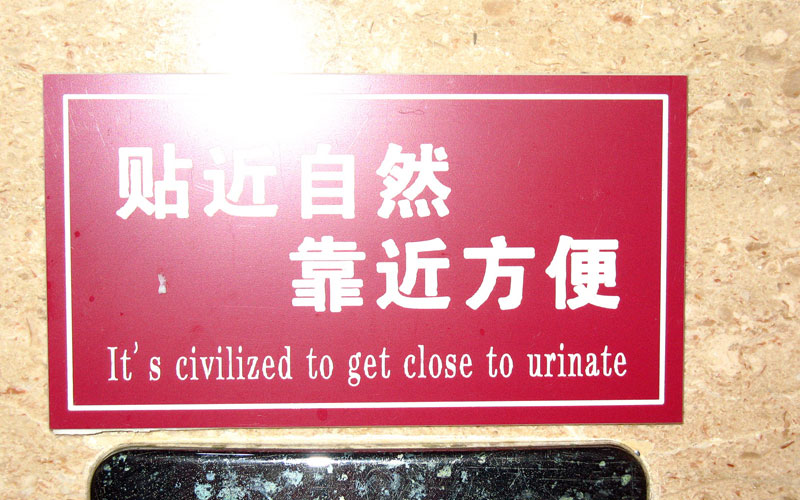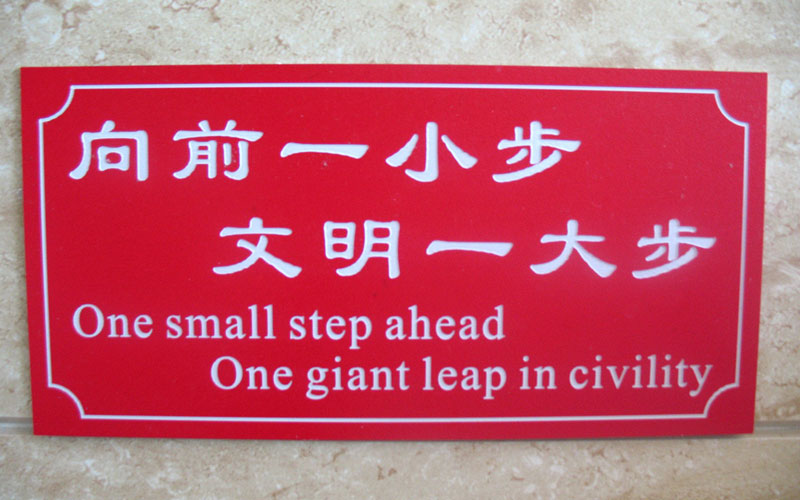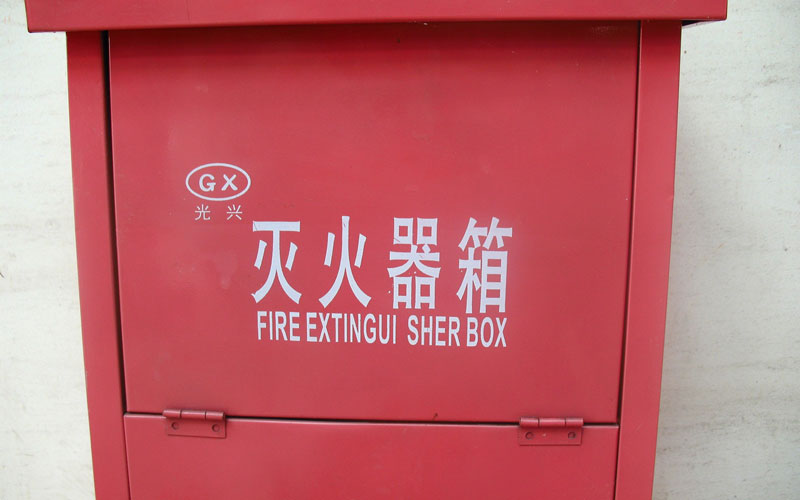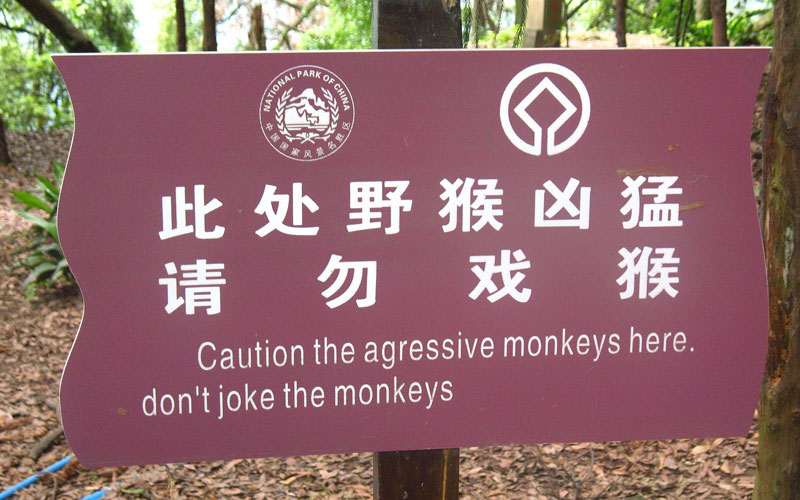Don't joke the monkeys
« previous post | next post »
I believe that the following photographs are exclusive for Language Log, since they were taken by Ori Tavor in Sichuan province this past summer, and I don't think that he has sent them anywhere else.
I'll first say where the photographs were taken and generally what category they fall into, and then explain each of them briefly. They will not each receive the full-dress treatment I usually give Chinglish specimens, both because there are too many of them and because they're fairly obvious.
No.1 and no.5 are classic examples of translation software. No. 1 was taken next to the Wenshu (Manjusri) monastery in Chengdu and no. 5 was taken outside Baoding Temple at the foot of Emei Shan.
No.2 and no.3 are apparently part of the PRC's ongoing war against disorderly urination ("the lesser convenience"), a topic that we have touched upon many times on Language Log. They were taken at the Big Buddha site in Leshan and on Mt. Emei.
No.4 was taken at the entrance hall to the Mt. Emei site.
No.6 was taken on Mt. Emei, where monkeys are a real menace.
Sāzi dòuhuā 撒子豆花 is a kind of super-soft bean curd with veggies, etc. sprinkled on top (sā 撒 means "spread" and zi 子 is a colloquial suffix). Google Translate renders sāzi dòuhuā 撒子豆花 as "spread sub-curd". The translator may have thought that sāzi sounds like "Caesar", although the latter is usually rendered in Mandarin as Kǎisǎ 凯撒. It is possible that the "sub-" of "sub-curd" somehow triggered "Caesar sub". Indeed, when we put "Caesar sub" in Google Translate, the Chinese rendering comes out as sāzi 撒子! That's about as far as I want to go with this one.
This sign over a urinal enjoins gentlemen to "tiējìn zìrán, kàojìn fāngbiàn" 贴近自然,靠近方便 ("get close to nature, step forward to urinate"), i.e., don't do it on the floor.
Xiàng qián yī xiǎo bù, wénmíng yī dà bù 向前一小步,文明一大步 ("one small step forward [to urinate], one big step forward for civilization"). Shades of Neil Armstrong!
The translation of mièhuǒqì xiāng 灭火器箱 as "fire extinguisher box" presents no problems. What is curious here is the way the painter of the sign has broken up the three English words into four clumps in an attempt to match the four Chinese characters. This is the opposite treatment from running together all the letters of English words, which used to be common in Chinglish signs, but has become increasingly less so in recent years.
The sign advertises that this inn is the Jù mín shānzhuāng 巨民山庄 ("Villa of Giants") and that its services and amenities include zhùsù 住 宿 ("lodging"), cānyǐn 餐饮 ("food and drink"), xiūxián 休闲 ("rest; leisure"), yúlè 娱乐 ("entertainment"), and cháshuǐ 茶水 ("tea [water]", cf. German "Teewasser").
The sign politely informs the public: cǐ chù yě hóu xiōngměng, qǐng wù xì hóu 此处野猴凶猛,请勿戏猴 ("the monkeys here are fierce; do not tease / play with the monkeys").
The allure of Chinglish never fades. More charming examples on the way.






F said,
October 20, 2011 @ 1:20 am
I've only ever encountered a transitive use of "to joke" (meaning "to kid, to toy with") in Hemingway (The Sun Also Rises.) I wonder if the translation software picked that up from him. Occam's razor says no.
Benvenuto said,
October 20, 2011 @ 2:54 am
More likely the muppet Zoe: http://muppet.wikia.com/wiki/Zoe than Hemingway.
But actually I think transitive 'to joke' is fairly common, it's the kind of cute mistake that children often make and so has been adopted into slang. See also Lady GaGa lyric: http://www.metrolyrics.com/i-hear-them-lyrics-lady-gaga.html
Bob Violence said,
October 20, 2011 @ 4:57 am
It's nothing that elaborate — 戏 in Chinese has multiple translations (joke, tease, play, make fun) and can be transitive or intransitive. Either their translation software didn't account for the difference in English, or they checked a Chinese-English dictionary and went with the first word that seemed right, again not distinguishing the transitive from the intransitive.
For the record, Google Translate renders the phrase as "do not play monkey," which I think is actually a valid translation (as in "don't act like a monkey"). Baidu Fanyi produces "don't monkey show," treating 戏猴 as a fixed expression. Google also translates 戏猴 by itself as "monkey show."
Jon Weinberg said,
October 20, 2011 @ 6:11 am
@F and Benvenuto, here's a Lily Allen lyric:
"Oh my gosh you must be joking me / if you think that you'll be poking me"
sm said,
October 20, 2011 @ 6:22 am
The fire extingui sher box seems to be a widespread thing — I saw one in Xi'an last year.
Steve F said,
October 20, 2011 @ 7:42 am
I've been aware of transitive 'joke' as in Lily Allen's 'You must be joking me' among British-English speakers for at least 20 years now, possibly longer – there's some comment about it dating from 2005 here http://painintheenglish.com/case/412
which claims the transitive use is noted in the OED (I'm not able to check this myself at the moment.) I would have guessed it was largely a British idiom, but Lady Gaga's use of it would suggest that it is in US English too.
My guess is that it derives from the more common, and definitely transitive, 'you must be kidding me.'
Carley said,
October 20, 2011 @ 7:56 am
Ooh, my husband can confirm the existence of the "One small step ahead, one giant leap in civility" sign–I remember he commented on it at the airport in Guilin.
Aaron Toivo said,
October 20, 2011 @ 8:00 am
"Joke" is commonly transitive, it just normally takes a subclause or a quotation as its complement ("He joked that you can't get down off an elephant", and so forth). The anomaly here lies in "joke" taking a simple noun as its complement, not in having one.
But "you must be joking me" is an idiom that isn't productive: you can't change the verb's tense (*you must have joked me), and you can't easily change the pronoun to 2nd or 3rd person (??you must be joking him).
Steve F said,
October 20, 2011 @ 8:02 am
The earliest occurrence of 'you must be joking me' in Google books is 1943 and is American.
Plane said,
October 20, 2011 @ 10:49 am
Is "increasingly less so" standard? I suppose it probably is, but it tripped my interesting-dar, and I had to re-read it a couple times.
Joe McVeigh said,
October 20, 2011 @ 11:13 am
It's obviously a Public Enemy reference ("The monkey ain't no joke" – Gett Off My Back).
The Chinese National Park Service be kicking it old school. Respect.
Anthony said,
October 20, 2011 @ 1:35 pm
The two urinal signs are at least reasonably good English, even if the first one substituted "civilized" for "close to nature".
Is the third ideogram in the fire extinguisher photo ever pronounced "sher"? If so, it would be a nice pun.
Nelson said,
October 20, 2011 @ 9:17 pm
I would guess the use of "civilized" is chosen deliberately: "Get close to nature" would sound a little strange in English, and I'm not sure I'd know what it meant. Those two do seem human-translated.
Rodger C said,
October 21, 2011 @ 8:10 am
Is this related to the obsolete meaning of "nature" as a euphemism for genitals? Uh, no.
Brendan said,
October 23, 2011 @ 9:15 am
I think the "sub" in 凯撒子豆花 must come from "子" in the sense of e.g. 子公司 (subsidiary company).
Lareina said,
October 27, 2011 @ 12:12 pm
Caesar Salad has its Chinese version now!!!!!!!!!! LOL!!!!!!!!!!
This post made me laugh so hard that I slipped off the chair in the middle of night and my roommate knocks asks if anything goes wrong…
It's surprising how the translation software now can adjust order of wording like the last picture does…
But how is 住宿 in any way related to put up?
I actually googled 撒子豆花 right after I read this amazing post…:D
Ted said,
November 4, 2011 @ 10:24 pm
Lareina: in English, "put up" is idiomatic and has as one of its meanings "house" (v.t.). So "I put him up for a couple of nights" means "he was a guest in my house for a couple of nights." I actually understood this correctly through the logical chain "put up" –> "we can put you up" –> "rooms are available."